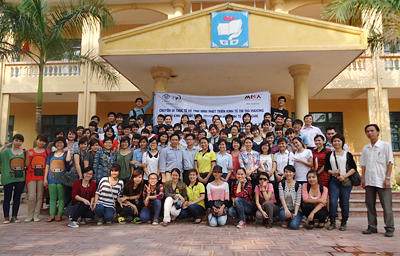Faculty of Development Economics (FDE) is an affiliated unit of the VNU University of Economics and Business (UEB). The dynamic and harmonized development of the Faculty has made significant contribution to empower the UEB’s position as well as helped to solve the theoretical and practical problems in the country's development process and international integration.
Young member of the UEB
Founded on 3rd March 2008, after more than 7 years of stabilizing organization and operation, strengthening cooperation with key strategic partners, preparing available resources for the development and breakthrough, so far FDE has 18 permanent faculty members of three departments: Economics, Public policy and Economics of environmental resources. All three departments of the faculty are integrated with many different subjects of cross-sector nature. FDE gathered highly qualified and experienced lecturers in teaching and research.
As a young member of the UEB, up to now, the faculty has had 4 sessions of graduates and more than 500 students enrolled. The goal of the program is training of bachelors in development economics oriented as experts and leaders, capable of analyzing, evaluating, synthesizing, doing research and teaching development economics in state agencies, development organizations, enterprises, research and education institutions. Students can also participate in higher education and gain experiences to become analysts, policy makers, leaders in the field of development economics.
Dynamic training program
Studied at the FDE, students are equipped with: (1) General knowledge with subjects of computing, English, complementary skills etc. (2) Field knowledge with advanced mathematics, statistics probability, mathematical economics (3) Knowledge by sector block: microeconomics, macroeconomics, principles of statistics, econometrics, teamwork skills, sociology, logic (4) Knowledge by sector group: economic law, research methodology, in-deep microeconomics, in-deep macroeconomics, development economics, management, principles of marketing (5) Knowledge by sector: in-deep development economics, public economics, environmental economics, environmental economics, green growth, public policy, development project management, environmental management etc.
In the knowledge by sectors and sector groups, students will have required and optional subjects upon demand of each student. In addition, students can actively select their depth based on curriculum framework. The faculty offers three in-deep training programs, including: public policy, environment, sustainable development and economics.
The training curriculum of bachelors in development economics is designed to renew teaching methods: reducing theory teaching hours, increasing discussion and self-study hours, following student-centered teaching method. Different assessment will be applied depending on the requirements of each subject, including exercises, research, case studies, group presentations, midterm and final exams.
2nd year student are off campus to visit state management agencies, enterprises or projects and local organizations. 3rd year students can take internship at research centers, institutes and projects.

Faculty and students at the Faculty KTPT actual trip in Luc Nam - Bac Giang
Also, students of FDE, after at least 2 semesters, can enroll a second program of international economics or finance and banking. Thus, after graduation students may have two college degrees. "At the FDE, students are the most important factors in their own learning. So, we always ensure that students have easy access to all support resources, both inside and outside classroom. Faculty will have academic advisors for each course, the staff of the department will also support the students if there are any problems related to learning" Dr. Nguyen Quoc Viet - Dean of the Faculty said.
Opportunity to participate in scientific research
Being a research-oriented faculty, the FDE also focused on equipping students with basic research foundation. The faculty created the most favorable condition to support students in doing research. Students can start individual studies; write for the “Sustainable Development Journal” (Student research journal of FDE); participate in research of faculty members.
.jpg)
The Faculty gave research orientation for students at beginning of school year
Besides the general curricular activities, the faculty also organizes regular exciting events for students. With dynamic and youthful environment at the FDE, students can access to new ways of thinking, have chance to improve skills and professional knowledge as well as develop personal skills and scientific thinking.
>>> Click here to see the title in Vietnamese.